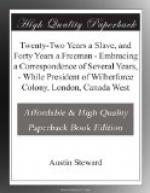JOHN BUDD.
Auburn, N.Y., May, 1833.
* * * * *
REPLY TO J. BUDD BY A. STEWARD.
To THE REV. J. BUDD,
Sir:—We feel under renewed obligation to you, for you friendly advice; but we have already sent out several copies of our circular to different places, and probably some of them have been printed before this time.
We have no object in view, but truth, justice,—the greatest good of the Settlement, and of our brethren in general. Israel Lewis has, however, collected large sums of money, for our relief, of which we have not had the benefit. Nearly two years ago, he was appointed agent for the Colony, to collect funds to build a meeting-house, to endow schools, &c. In less than one year he received more than two thousand dollars, which he squandered; and we have neither meeting-house nor schools, nor never will have, so long as the money goes into the hands of Lewis. All that we would have forgiven him gladly, if he would consent to be still and not usurp the agency against the wishes of the people.
Sir, is it not expected that he would appear well; as you say, that “the whole deportment and manner of Lewis, who has been in this place, evidently have impressed the people in his favor,”—while collecting money with the eye of the public upon him. But follow him home into another kingdom, and there see the man in his true character; stripped of his borrowed plumage,—and we will guarantee that you would agree with us, in believing that he is an arch hypocrite.
We should be sorry to prejudice the public against our Settlement, more especially when we are actuated by the purest motives,—that of preventing the Christian public from being imposed upon, by drawing large sums from them for us, as they suppose, when in truth such sums never reach us at all.
Sir, we know that you are actuated by the purest motives, but you are deceived in the character of the man, (Lewis). When I was living in the States and only saw him there, collecting money for the poor, I thought him honest as you now do; but two or three years’ residence in Wilberforce Colony, has abundantly satisfied me that his object is to get money, that he may live in a princely style, and not for the benefit of the poor as he pretends.
Such are the true facts in the case. We should be glad to have the name of James S. Seymour, Esq., added to the list, and any other prominent citizen you may think would help the cause.
In regard to the investigation at Albany, we do not see how the public are to arrive at the facts in the case from any statement Lewis may make; for all his statements that I have seen in print, are positively void of truth, in the most essential part, so that they are of little or no importance at all unless substantiated by other testimony.




